Unit 2 课下参考资料
大学跨文化英语 综合教程I Unit 2 Rethinking Independence 课后习题参考答案
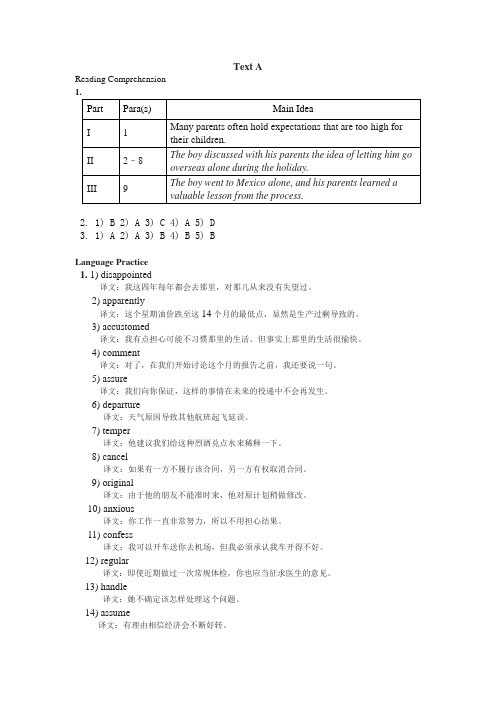
Text AReading Comprehension2. 1) B 2) A 3) C 4) A 5) D3. 1) A 2) A 3) B 4) B 5) BLanguage Practice1. 1) disappointed译文:我这四年每年都会去那里,对那儿从来没有失望过。
2) apparently译文:这个星期油价跌至这14个月的最低点,显然是生产过剩导致的。
3) accustomed译文:我有点担心可能不习惯那里的生活。
但事实上那里的生活很愉快。
4) comment译文:对了,在我们开始讨论这个月的报告之前,我还要说一句。
5) assure译文:我们向你保证,这样的事情在未来的投递中不会再发生。
6) departure译文:天气原因导致其他航班起飞延误。
7) temper译文:他建议我们给这种烈酒兑点水来稀释一下。
8) cancel译文:如果有一方不履行该合同,另一方有权取消合同。
9) original译文:由于他的朋友不能准时来,他对原计划稍做修改。
10) anxious译文:你工作一直非常努力,所以不用担心结果。
11) confess译文:我可以开车送你去机场,但我必须承认我车开得不好。
12) regular译文:即使近期做过一次常规体检,你也应当征求医生的意见。
13) handle译文:她不确定该怎样处理这个问题。
14) assume译文:有理由相信经济会不断好转。
15) complain译文:他们对于加班从不抱怨。
2. 1) A 2) B 3) C 4) A 5) B 6)B 7) B 8) A 9)D 10) C3. 1) down let sb. down 让某人失望2) from distract sb. from doing sth. 分散(某人的)注意力3) to stick to 坚持4) for (be) bound for 开往……5) in stop dead in one’s tracks 突然停止4. 1) development 发展2) internationalization 国际化3) Perseverance 毅力4) bitterness 苦涩5) educator 教育家6) failure 失败7) acceptance 接受8) pressure 压力5. 注解:本单元的语法内容涉及情态动词表达的情绪、态度或语气,主要关注can, may, must和need。
2020高考英语新创新一轮复习选修8Unit22EnvironmentalProtection课下作业一_三含解析北师大版
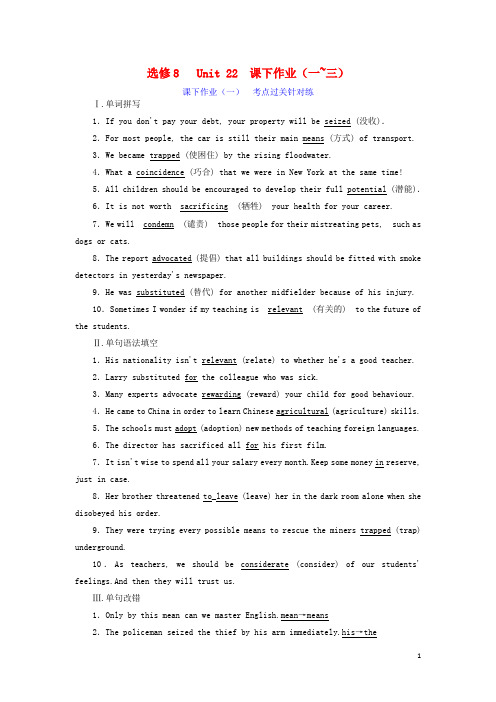
选修8 Unit 22 课下作业(一~三)课下作业(一)考点过关针对练Ⅰ.单词拼写1.If you don't pay your debt, your property will be seized (没收).2.For most people, the car is still their main means (方式) of transport.3.We became trapped (使困住) by the rising floodwater.4.What a coincidence (巧合) that we were in New York at the same time!5.All children should be encouraged to develop their full potential (潜能).6.It is not worth sacrificing (牺牲) your health for your career.7.We will condemn (谴责) those people for their mistreating pets, such as dogs or cats.8.The report advocated (提倡) that all buildings should be fitted with smoke detectors in yesterday's newspaper.9.He was substituted (替代) for another midfielder because of his injury.10.Sometimes I wonder if my teaching is relevant (有关的) to the future of the students.Ⅱ.单句语法填空1.His nationality isn't relevant (relate) to whether he's a good teacher.2.Larry substituted for the colleague who was sick.3.Many experts advocate rewarding (reward) your child for good behaviour.4.He came to China in order to learn Chinese agricultural (agriculture) skills.5.The schools must adopt (adoption) new methods of teaching foreign languages.6.The director has sacrificed all for his first film.7.It isn't wise to spend all your salary every month.Keep some money in reserve, just in case.8.Her brother threatened to_leave (leave) her in the dark room alone when she disobeyed his order.9.They were trying every possible means to rescue the miners trapped (trap) underground.10.As teachers, we should be considerate (consider) of our students' feelings.And then they will trust us.Ⅲ.单句改错1.Only by this mean can we master English.mean→means2.The policeman seized the thief by his arm immediately.his→the3.The discovery of new evidence led to the thief's be caught.be→being4.Pack ice around Iceland was becoming a threat with navigation.with→to 5.The newer will be the substitute with me as your English teacher.with→for 6.Giving that they're inexperienced, they've done a good job.Giving→Given 7.What coincidence!We happened to be travelling on the same train.What后加a8.Though seats in the library are tight, my friend Tom has reserved one to me. to→for9.Having trapped in the traffic jam for hours, he became impatient.Having_后加been10.Some people advocated limit the number of cars on the main road.limit→limitingⅣ.完成句子1.Apart_from_Beijing_and_Shanghai,_we also visited some other cities during the holiday.除了北京和上海,假期里我们还参观了一些其他城市。
资料《Unit2课文原文与翻译(素材)译林版九年级英语下册》

译林版九年级下册英语课文及翻译UNIT 2英中对照版UNIT2Comic strip1. Who do you think is the greatest person in history,Eddie?埃迪,你认为史上最伟大的人是谁?2. I think it’s Paul Yum.我认为是保罗•亚姆。
3. Paul Yum? I’ve never heard of him.Who’s he?保罗•亚姆?我从没听说过他。
他是谁?4. He’s an inventor.He invented my favourite food.他是一位发明家。
他发明了我最喜爱的食物。
九下· p21-23ReadingThe first man to walk on the MoonNeil Armstrong(1930 – 2012)was the first man to walk on the Moon. Simon is now reading an article about the astronaut and his space travel. Here is the article.尼尔。
阿姆斯特朗(1930-2012)是首位漫步月球的人。
西蒙现在正在阅读一篇关于这位宇航员和他的太空旅行的文章。
这是那篇文章。
NEIL ARMSTRONG尼尔•阿姆斯特朗Neil Armstrong was born on 5 August 1930 in Ohio,the USA. He became interestedin flying when he took his first flight at the age of six, He received his student pilot’s licence when he was 16.尼尔•阿姆斯特朗于1930年8月5日出生于美国俄亥俄州。
在他6岁参加第一次飞行时,他就开始对飞行感兴趣。
高考英语大一轮复习 第一部分 Unit 2 Poems课下作业 新人教版选修6

Unit 2 PoemsⅠ.情景默写1.The load (负担)on this rope is more than it will bear.2.If you don’t know the answer,just leave a blank (空白).3.The boy likes to walk on the sand with bare (赤裸的)feet.4.I regret to tell you that the tickets cannot be exchanged (调换).5.He wanted to transform (转变)himself into a successful businessman.6.The other boys are always teasing (戏弄)him because he is too fat.7.This price is his minimum (最低限度);he refuses to lower it any further. 8.He had arranged the glasses in some beautiful patterns (图案)on the table. 9.She mentally ticked (标记号)off the names of the people she had already spoken to.10.Mr.Harvey and his daughter have asked me to convey (传达)their very kind regards.11.To give the fish or to teach the fishing skill or both depend on the concrete (具体的)conditions.12.The evidence demonstrates how easily people can hold mutually contradictory (矛盾的)beliefs.13.The members of the team are practising very hard in order to gain the championship (冠军称号)in the coming games.14.The bride (新娘)and bridegroom (新郎)received their guests in the great hall. 15.Do remember not to let_out (泄露)the news.It’s between you and me.16.He has to stay_up (熬夜)late to prepare for the important examination. 17.What if you were to run_out_of(用完) money? What would you do?18.This passage just didn’t make_sense (讲得通)to me,no matter how I read it.19.The film which is starred by Fan Bingbing is_popular_with (受……欢迎)the young.20.You’ve been working hard for the past week.You must take_it_easy (轻松)and relax over the weekend.Ⅱ.词性转换1.We were touched by the warmth (warm)of their welcome.2.I like salty (salt)fish.I bought some in Safeway,but it was sweet.3.This is a book that displays the considerable scholarship (scholar)of its author. 4.As a matter of fact,employees expect to work flexibly (flexible)in the workplace. 5.The two young people eventually (eventual)got married after having been friends for several years.6.We’d better find out a way to solve this problem appropriately (appropriate)or we will suffer a great loss.7.So long as the youth is in,I cannot be sorrowful (sorrow),even though the dark night invades the world,the sun also may come back.8.It was dark in the room and we couldn’t see much at first,but after a few minutes our eyes got used to the darkness.(dark)9.Just like most romantic stories,it had a happy ending.The prince killed the monster and saved the princess in the end and they lived happily ever after.(end) 10.In order to bring advanced theories from foreign countries,he decided to be a translator and has translated hundreds of books from English into Chinese so far.His translation of some great works is popular among teachers.(translate)1.句型公式:why引导定语从句修饰先行词reason我去那里的唯一理由就是想看看我的老朋友。
2021版高考英语大一轮复习Unit2Workingtheland课下作业新人教版必修4

2021版高考英语大一轮复习Unit2Workingtheland课下作业新人教版必修4写作句型锤炼主体段落常用句型锤炼之十二:现在分词短语作结果状语先熟读背诵——杰出句型烂熟于心1.There were 25 countries taking part in the 9th China International Garden Expo, making it the greatest in the history.有25个国家参加了第九届中国国际园博会,使之成为历史上规模最大的一次。
2.Fifteen million trees were blown down by the high winds,blocking roads,paths and railway lines.1 500万棵树被狂风刮倒,把大小道路和铁路都堵塞了。
3.Water can absorb and give off a lot of heat without big changes in temperature,thus creating a stable environment.水能够吸取或放出大量的热量而其温度可不能变化专门大,因此能制造一个稳固的环境。
4.European football is played in 80 countries,making it the most popular sport in the world.在欧洲有80多个国家踢足球,这使它成为世界上最流行的运动。
后临模拟写——妙语佳句信手拈来1.她父母死了,给他留下了许多钱。
Her__parents__had__died,leaving__him__a__lot__of__money.2.在悉尼奥运会上,中国队共获28枚金牌,在所有的参赛国中金牌总数名列第三。
In__Sydney__Olympics__the__Chinese__team__got__28__gold__medals,ranking__third__of__all__the__competing__countries.3.这位伟大的领导昨天逝世了,这让他的人民专门难过。
Unit2andunit7课后练习及答案

Unit2andunit7课后练习及答案Unit 21.I'm going to sell the house, together with the furniture2. 2. You had a traffic accident, so you'll have to appear in court.3. 3. There is an advertisement for our new product in the local newspaper.4. 4. I desire nothing other than to be left in peace. So just go away.5. 5. It is foolish to spend money on something you don't use.6. 6. We should try hard to develop tourism (旅游业). Tourism creates jobs for local7.people.8.7. The development of the world's economy will bring about many new problems.9.8. Mother will need additional help to do the work since she is not in good health., the hat I had just bought was no longer in fashion.2. You ought to pay more attention to the quality of these goods.3. I want to complain about the food and the service in this restaurant.4. The trend at the moment is toward a more natural and less made-up look.5. I will meet Mr. Smith at the book club at 10 o'clock.6. We have invited an expert in this area to give us a speech.7. I have a strong desire for fresh air after staying in the small room for severalhours.8. His knowledge is only limitedtowhat is taught in class.All types of fads come and go around us. What is in style today may go out of date next month because the change is so fast. Some people, especially teenagers are busy following fads In today's society, almost everyone is influenced by fashion to some degree.1. Many people take part in exercises to lose weight and change their body shapes.2. The young man who had just come to work in the office was rated as one of thefew best employees in the company.3. She looks ill, as she has been experiencing a sleeping disorder for some time.4. In my own life, I have developed some of both my mother and father's character5. Dog owners have been required to keep their animals under control.6. I understand some of the subject's key concepts, but I'm not sure about its details.7. The results of the study have certainly justified the money that has been spent onthe project.8. What is known as "good reason" is the ability to judge rightly, separating the true from the false.1. She walks her dog every day on the beach.2. Some kinds of plants and animals are disappearing at a fast rate.3. The students show very positive attitudes toward their study.4. You must consider the problem in all its aspects.5. It's not easy for people to give up their bad habits.6. The old couple live off their nursery garden.7. The guest speaker was asked to comment on/upon his college life.8. I got my lost money back from a taxi driver.Unit 71."Problem student" is a term we attach to a student who always makes trouble inschool.2. You must let the kids know: one will come across many difficulties in one's life and a life free from allworry just doesn't exist.3. In order to find them easily, we should make a careful arrangement of the books in thelibrary.4. When Tim and his old classmates meet, they will always chat about the good olddays at school.5. Learning a foreign language well can help bridge the gap between differentlanguages and cultures.6. Traveling abroad isn't necessarily expensive as long as you find hotels and restaurants ofreasonable prices.7. I feel really guilty about not having written to you for so long.8. These days we are so accustomed to using e-mail that we seldom use post offices.1. The school attached great importance to the sports meeting and required everystudent to attend it.2. When the children grow up, they usually feel most comfortable with the kinds offood they had in their own homes.3. It has been hard to adjust to the idea of being a waitress but now I'm gettingsatisfaction from work.4. Hard work, combined with right methods, will always give you an advantage overothers.5. He corresponds with people in the English-speaking countries in order to improvehis written English.6. The medicine needs to be taken on a daily basis.7. More people were sent out to search the lost team who had been out of touch withthe base (大本营).8. He was turning the pages back and forth to look for possible mistakes.Many of us complain that there is a(n)gap between our parents and ourselves. Even though some of us live with our parents, we still feel out of touch. But ask ourselves these questions: how many of us chat with our parents on a daily basis How many of us openly exchange words of affection with our parents For those who stay away from home, how often do we correspond with them either by writing letters or sending e-mail Remember, a small effort on your part will lead to a giant step in crossing the gap.1. A small grass fire has turned into a big forest (森林) fire and this has caused great alarm among the people in that area.2. I wouldn't recommend reading in this light; it may affect your eyes.3. Needs of the poor and sick remain major problems. This is especially true in thethird world countries.4. Don't let the boy loose in the garden; he'll pull up all the flowers.5. The cake will spoil if you don't keep it in a cool place.6. He feels that he got much benefit from conversations with foreigners, as he canspeak English very well now.7. It is illegal to take or sell drugs: one will be put into prison if he does so.8. He was surprised at her rude remarks, but he pretended he did not hear.1. "Look out, you might fall off the tree!" The mother warned her 5-year-old son.2. Although it may seem difficult to finish the work within a month, he was quite sure of himself.3. Eating too much, combined with lack of physical exercises, may lead to onetype of disease or another.4. The shoe factory was shut down for lack of capital.5. Don't go to that place in the evening as there are some young men hanging out and looking for trouble.6. He tricked the little girl into opening the door by claiming that he was hermother's close friend.7. A marriage on the basis of money is bound to fail.8. After you finish the work, please log off the system and then shut down.。
综合教程IUnit 2课后练习参考答案
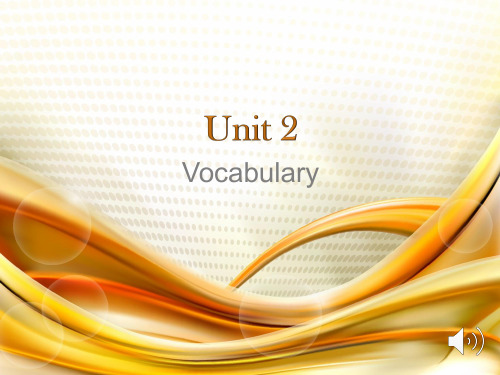
2. The whole generation were brought up to be _________ of material things, so that they had great difficulty settling down to a market economy.
A✓. scornful
Children have to obey the discinples.
key: the part of a plan, action, etc. that will make it possible for it to succeed
Working well as a team is key to success.
一项新研究发现,夫妻双方在必要的时候斗斗嘴有益 于健康。
send for = ask sb. to request sb. else to come
e.g. I came late because I had to send for the doctor for my grandfather. 我来晚了,因为我得给我爷爷去请大夫。
10. The Smiths rearranged things, so that new kitchen units would _f_it___.
1. He was working on a children’s book _________ Limericks.
A. tagged B. headed C. labeled ✓D. entitled
The page was headed “My Early Life”.
label: to use a word or phrase to describe someone or something, but often unfairly or incorrectly
Unit 2 The Freedom Givers
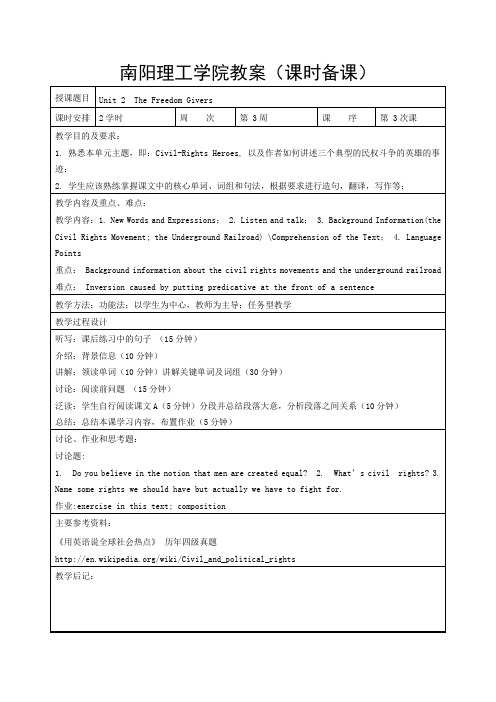
Methodist(member) of this denomination
Pre-reading Questions
1. Name some rights we should have but actually we still have to fight for.
Parts
Paragraphs
Main Ideas
1
1-5
It is high time to honor the heroes who helped liberate slaves by forging the Underground Railroad in the early civil-rights struggles inAmerica.
/wiki/Uncle_Tom%E2%80%99s_Cabin
2.Underground Railroad
The Underground Railroad was an informal network of secret routes and safe houses used by 19th-century black slaves in theUnited Statesto escape tofree statesandCanadawith the aid of abolitionists who were sympathetic to their cause. Created in the early 19th century, the Underground Railroad was at its height between 1850 and 1860. One estimate suggests that by 1850, 100,000 slaves had escaped via the "Railroad".
新视野大学英语2册(第三版)unit2-课后习题答案

• MOOCs can encourage communication among participants who bring a variety of viewpoints, knowledge, and skills to the course;慕课能够促进参与者之 间的交流,使得多种观点、知 识和技能涌现到课堂上来;
• When you were sweating and
out of breath, did you ever wish that you could only stop taking a P.E. class in college? However, taking P.E. courses can be advantageous to all college students.
6. Banked Cloze
1.insight 3. boost 5. prospect 7. invest 9. affected 2. education 4. mystery 6. promote 8. appreciation 10. speculate
7. Expressions in use
• In recent years, with the development of Internet technology, the construction of digital education resources of our country has made great achievements.
Word Building -ify
intense ➝ intensify
identify ➝ identity
Word Building 5. 1.excess 2. bearing 3. objective 4. intensify 5. execute 6. promising 7. exclude 8. identity 9. offend 10. housing
高考英语一轮复习Unit2ParentsandChildren课下练重庆大学版必修2(2021学年)
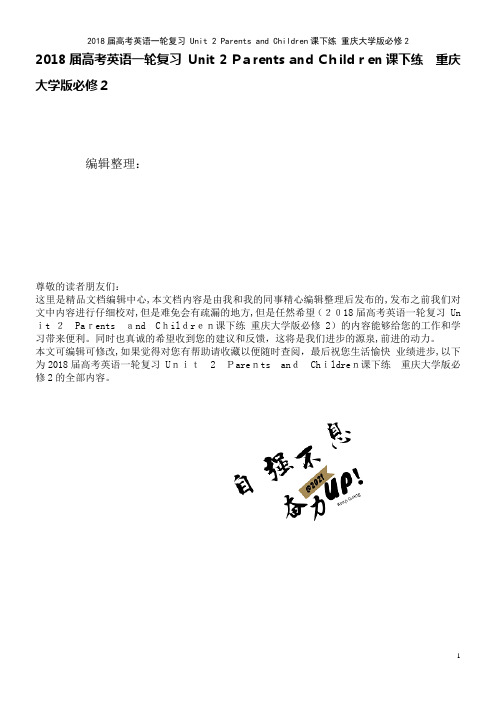
2018届高考英语一轮复习Unit 2 Parents and Children课下练重庆大学版必修2编辑整理:尊敬的读者朋友们:这里是精品文档编辑中心,本文档内容是由我和我的同事精心编辑整理后发布的,发布之前我们对文中内容进行仔细校对,但是难免会有疏漏的地方,但是任然希望(2018届高考英语一轮复习 Un it 2Parents and Children课下练重庆大学版必修2)的内容能够给您的工作和学习带来便利。
同时也真诚的希望收到您的建议和反馈,这将是我们进步的源泉,前进的动力。
本文可编辑可修改,如果觉得对您有帮助请收藏以便随时查阅,最后祝您生活愉快业绩进步,以下为2018届高考英语一轮复习 Unit 2 Parents andChildren课下练重庆大学版必修2的全部内容。
Unit 2Parents and Children[课下练熟高考]“阅读+七选五+完形"组合练--练题型(限时:35分钟)Ⅰ。
阅读理解(2017·永川区一模)There is anold Chinese proverb that states“On e generation plants the trees; another gets the shade”, and this is how it should be with mothers and daughters。
The relationship between a mot her and daughter is sometimes confusing. If close, the relationship can be similar to friendship。
However, themother and daughte rrelationship has unique characteristics that distinguish it from a friendship.These characteristics include the hierarchy (等级) and unconditionallove, which preclude mothersand daughters from being bestfriends.Marina,27 years old, says,“I love spending timewith my mom, but I wouldn’tconsider her my best friend. Best friends don’t pay for your wedding。
八年级英语下册 Unit2学案 人教新目标版
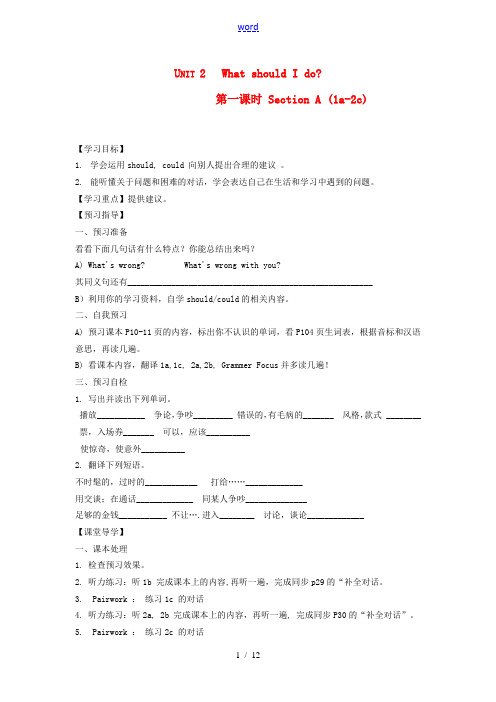
U NIT 2 What should I do?第一课时 Section A (1a-2c)【学习目标】1.学会运用should, could 向别人提出合理的建议。
2.能听懂关于问题和困难的对话,学会表达自己在生活和学习中遇到的问题。
【学习重点】提供建议。
【预习指导】一、预习准备看看下面几句话有什么特点?你能总结出来吗?A) What's wrong? What's wrong with you?其同义句还有________________________________________________________B)利用你的学习资料,自学should/could的相关内容。
二、自我预习A) 预习课本P10-11页的内容,标出你不认识的单词,看P104页生词表,根据音标和汉语意思,再读几遍。
B) 看课本内容,翻译1a,1c, 2a,2b, Grammer Focus并多读几遍!三、预习自检1. 写出并读出下列单词。
播放___________ 争论,争吵_________ 错误的,有毛病的_______ 风格,款式 ________ 票,入场券_______ 可以,应该__________使惊奇,使意外__________2. 翻译下列短语。
不时髦的,过时的____________ 打给……_____________用交谈;在通话_____________ 同某人争吵______________足够的金钱___________ 不让….进入________ 讨论,谈论_____________【课堂导学】一、课本处理1. 检查预习效果。
2. 听力练习:听1b 完成课本上的内容,再听一遍,完成同步p29的“补全对话。
3. Pairwork :练习1c 的对话4. 听力练习:听2a, 2b 完成课本上的内容,再听一遍, 完成同步P30的“补全对话”。
5. Pairwork :练习2c 的对话二、讲练互动参考同步p301 should是________的过去式,用作情态动词时,并不表示_______的动作,只是语气显得更加________。
小学三年级英语下册《Unit2Myfamily!》教案优质范文五篇

小学三年级英语下册《Unit 2My family!》教案优质范文五篇在教育的百花园中,百花吐艳离不开园丁爱的奉献。
下面是小编给大家准备的小学三年级英语下册《Unit 2My family!》教案优质范文,供大家阅读参考。
小学三年级英语下册《Unit 2My family!》教案优质范文一一、学生分析本课围绕学生感兴趣的主题 My family引出句子及其回答This is my … ….She’s/He’s…, 同时教会学生brother,sister,grandfather,grandmother,这四个单词。
这些新词对于三年级的学生来讲比较容易掌握。
但其回答She’s , He’s… ….有些学生分得不是很清楚。
二、教材分析这课的内容是小学三年级下册第二单元中介绍家庭成员的内容,本课是功能型的交际型的交际训练课,我借助“任务型”教学采用多样化的教学手段将听、说、玩、演、唱溶于一体,激发学生学习英语的兴趣和愿望,使学生通过合作学习体验荣誉感和成就感从而树立自信心,发展自主学习的能力,形成初步用英语进行简单日常交际的能力。
三、教学目标依据教材内容,结合学生特点及新课标对三年级学生能力的要求,本节课的教学目标确定如下。
【知识目标】听、说、认读单词brother,sister,grandfather,grand mother, 句子This is my … ….She’s/ He’s…并能在情景中运用。
【能力目标】能通过询问知道一些人物是谁,能根据主题My family展开对话,并尝试模仿情景自编对话。
【情感目标】通过创设情景,增长课外知识,激发学生热爱自己家庭成员的美好情感。
【学习策略】注重观察、模仿、理解、想象。
四、教学策略为了顺利完成教学目标,更好地突出重点、突破难点,我以创设情景,让学生在轻松快乐的氛围中学习英语为宗旨,设计了热身、预习、新授、练习、任务这五个井然有序的环节。
教学不是简单的知识传授,为了不使教学变得枯燥无味,我采用多种教学手段,如比较形象明星图片,家庭相片等启发、引导学生思维,培养不同层次的学生大胆用英语交际的能力,让学生真正进入实际情景中去交流。
英语课课练下册参考答案
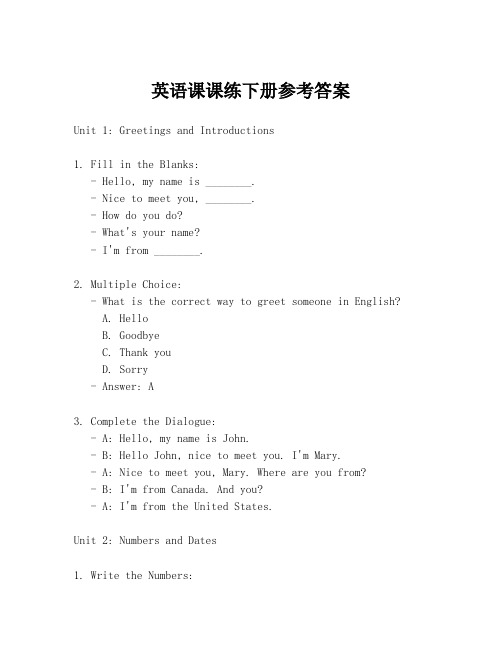
英语课课练下册参考答案Unit 1: Greetings and Introductions1. Fill in the Blanks:- Hello, my name is ________.- Nice to meet you, ________.- How do you do?- What's your name?- I'm from ________.2. Multiple Choice:- What is the correct way to greet someone in English?A. HelloB. GoodbyeC. Thank youD. Sorry- Answer: A3. Complete the Dialogue:- A: Hello, my name is John.- B: Hello John, nice to meet you. I'm Mary.- A: Nice to meet you, Mary. Where are you from?- B: I'm from Canada. And you?- A: I'm from the United States.Unit 2: Numbers and Dates1. Write the Numbers:- One: 1- Two: 2- Twenty: 20- Fifty: 50- One hundred: 1002. Match the Dates:- January 1st: New Year's Day- March 8th: International Women's Day- May 1st: Labor Day- October 1st: National Day3. Calculate the Date:- If today is Monday and the event is on the 15th of this month, what day of the week will it be?- Answer: If today is Monday and there are 14 days until the 15th, it will be a Monday.Unit 3: Colors and Shapes1. Color the Shapes:- Circle: Red- Square: Blue- Triangle: Yellow- Rectangle: Green2. Choose the Correct Shape:- What shape is a stop sign?A. CircleB. SquareC. TriangleD. Rectangle- Answer: C3. Describe the Picture:- The picture has a red circle, a blue square, a yellow triangle, and a green rectangle.Unit 4: Family and Relationships1. Complete the Family Tree:- Father: John- Mother: Mary- Son: Tom- Daughter: Lily2. Match the Relationships:- Brother: Male sibling- Sister: Female sibling- Cousin: Child of an aunt or uncle- Uncle: Brother of a parent3. Write Sentences:- My father's brother is my uncle.- My mother's sister is my aunt.- I have one brother and two sisters.Unit 5: Food and Drinks1. Name the Food Items:- Apple- Bread- Cheese- Donut2. Choose the Correct Drink:- What do you drink when you are thirsty?A. WaterB. SoupC. JuiceD. Coffee- Answer: A3. Order at a Restaurant:- A: Good evening, I'd like to order a pizza and a glass of water, please.- B: Sure, what type of pizza would you like?- A: I'll have a margherita pizza, please.Unit 6: Animals and Nature1. Identify the Animals:- Lion: A large wild cat- Elephant: A large mammal with a trunk- Bird: An animal that can fly2. Match the Seasons:- Spring: The season of renewal- Summer: The hottest season- Autumn: The season of falling leaves- Winter: The coldest season3. Describe the Scene:- In the forest, there are lions, elephants, and birds. The trees are green in spring and covered in snow in winter.Unit 7: Daily Routines1. Sequence the Morning Routine:- 1. Brush teeth- 2. Take a shower- 3. Eat breakfast- 4. Get dressed2. Choose the Correct Activity:- What do you do after you wake up?A. SleepB. Eat breakfastC. Watch TVD. Brush teeth- Answer: D3. Write a Paragraph:- My daily routine starts with brushing my teeth. After that, I take a shower and get dressed. I then have breakfast before heading to school or work.Unit 8: Travel and Places1. Name the。
[配套K12]2019版高考英语大一轮复习 Unit 2 Poems课下作业 新人教版选修6
![[配套K12]2019版高考英语大一轮复习 Unit 2 Poems课下作业 新人教版选修6](https://img.taocdn.com/s3/m/2ca605c504a1b0717fd5dd83.png)
Unit 2 Poems写作句型锤炼主体段落常用句型锤炼之二十:否定词与比较级连用表示最高级先熟读背诵——精彩句型烂熟于心1.It was not until then that I suddenly realized nobody was happier than I was. 直到那时我突然意识到没有人比我更幸福了。
2.Your story is perfect; I’ve never heard a better one before.你的故事太完美了,我之前从来没有听过比这更好的故事。
3.I have never seen a more beautiful girl than Liu Yifei in my life.在我生活中我从来没见过比刘亦菲更美的女孩。
4.Nothing is more important than to receive education.没有比接受教育更重要的事。
5.I’ve never seen a nicer bird than this one.这是我见过的最好的鸟。
6.I decided to go with them,mainly because I had nothing better to do.我决定同他们一起去,这主要是因为我没有更好的事情可做。
后临摹仿写——妙语佳句信手拈来1.她唱歌多么动听啊!我从来没有听过更好听的了。
How__beautifully__she__sings!__I__have__never__heard__a__better__voice.2.我再同意你不过了。
__I__couldn’t__agree__with__you__any__more.__3.蒂姆不比他班上其他任何学生矮。
Tim__is__not__shorter__than__any__other__student__in__his__class.Ⅰ.重点单词—识记·联想·运用[会书写]一、核心单词1.convey vt. 传达;运送2.eventually adv. 最后;终于3.transform vi.& vt. 转化;转换;改造;变换4.appropriate adj. 适当的;正当的5.exchange n. 交换;交流;互换vt.& vi. 调换;交换6.sponsor n. 赞助人;主办者;倡议者vt. 发起;举办;倡议7.scholarship n. 奖学金;学问;学术成就8.load n. 负担;负荷物(尤指沉重的)二、阅读单词1.pattern n. 模式;式样;图案2.nursery n. 托儿所3.concrete adj. 具体的4.flexible adj. 灵活的;可弯曲的;柔顺的5.tease vi.& vt. 取笑;招惹;戏弄6.minimum n. 最低限度;最少量;最小数7.branch n. 枝条;支流;部门8.librarian n. 图书馆馆长;图书馆管理员9.forever adv. 永远10.section n. 部分;节;切下的块三、拓展单词1.contradictory adj.引起矛盾的;好反驳的→contradict v.反驳;否认;与……抵触/矛盾2.salty adj.含盐的;咸的→salt n.盐3.endless adj.无穷的;无止境的→end n.& v.终止;结束→ending n.结尾,结局4.translation n.翻译;译文→translate v.翻译→translator n.译员,翻译家5.sorrow n.悲伤;悲痛;懊悔→sorrowful adj.悲伤的;悲痛的6.bare adj.赤裸的;光秃的;稀少的n.最基本的要素→barely adv.仅仅,勉强;几乎不7.championship n.冠军称号→champion n.冠军8.darkness n.黑暗;漆黑→dark adj.黑暗的9.warmth n.暖和;温暖→warm adj.暖和的;温暖的→warmly adv.热烈地;温暖地[会积累]1.后缀o r必备名词集锦①translator 翻译家,翻译者②competitor 竞争人,对手③director 指导者,导演④indicator 指示者⑤governor 统治者,地方长官⑥actor 演员⑦visitor 参观者2.“取笑与愚弄”面面观①tease v. 取笑;戏弄②laugh at 嘲笑③make fun of 取笑④make a fool of 愚弄⑤play a trick on 捉弄⑥play jokes on 戏弄3.后缀ness高频名词荟萃①darkness 黑暗②sickness 疾病③loneliness 孤独④happiness 快乐⑤sadness 悲伤⑥kindness 善良[会应用] 用所给词的适当形式填空1.As you know,apart from tasty dumplings,what elderly people in the nursing home also need is warmth(warm) and care.2.The whole country mourned the death in Tianjin Explosion in great sorrow.It was unbearable to see the sorrowful eyes of the mourning people.(sorrow)3.In order to bring advanced theories from foreign countries,he decided to be a translator and has translated hundreds of books from English into Chinese so far.Histranslation of some great works is popular among teachers.(translate)4.It was dark in the room and we couldn’t see much at first,but after a few minutes our eyes got used to the darkness.(dark)5.—How did the story end?—Just like most romantic stories,it had a happy ending.The prince killed the monster and saved the princess in the end and they lived happily ever after.(end)Ⅱ.核心短语—识记·联想·运用[会书写]1.take__it__easy 轻松;不紧张;从容2.run__out__of__ 用完;用光3.be__made__up__of 由……构成4.in__particular__ 尤其;特别5.try__out 测试;试验6.let out 发出;放走;泄露7.be popular with 受到欢迎8.stay up 熬夜9.hold on 坚持;忍受10.make sense 有意义;讲得通[会积累]1.“v.+out”搭配的短语集锦①let out 发出;放走;泄露②leave out 省去;遗漏;不考虑③bring out 阐明;使显示;出版④make out 理解;辨认出⑤pick out 挑出;辨认出⑥figure out 想出;理解2.“v.+on”必备短语一览①hold on 别挂断;继续②turn on 打开③switch on 打开[会应用] 选用上表左栏短语填空1.The method seems good but it needs to be tried__out.2.If we hadn’t __run__out__of sugar,I wouldn’t have gone to the shops.3.The word “bookstore” is__made__up__of the two words “book” and “store”.4.I am interested in stories in general,and in detective stories __in__particular.5.“Take__it__easy,” Jim said to the other boys carrying the table down the stairs.6.I can tell you the truth,but you must promise not to let__out the secret.7.This passage just didn’t make__sense to me,no matter how I read it.8.What has made us puzzled is why this pop star is__popular__with the young. Ⅲ.经典句式—分析·背诵·仿写句型公式1:why引导定语从句修饰先行词reason。
Unit2Myfamily第3课时(教案)-2023-2024学年人教PEP版英语三年级下册
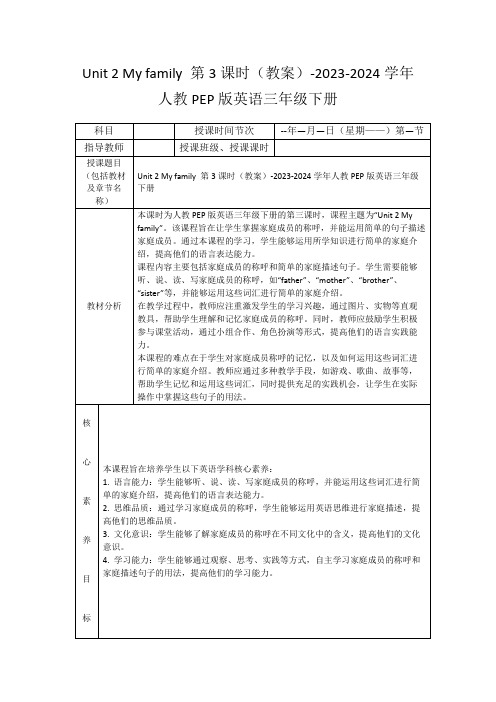
-监控预习进度:利用平台功能或学生反馈,监控学生的预习进度,确保预习效果。例如,通过在线平台的完成情况或微信群的讨论,了解学生的预习情况。
2.教学难点
本节课的难点是学生对家庭成员称呼的记忆,以及如何运用这些词汇进行简单的家庭介绍。由于学生可能对家庭成员的称呼不熟悉,因此需要通过多种教学手段帮助学生记忆和运用这些词汇。同时,学生可能不熟悉如何运用这些词汇进行简单的家庭介绍,因此需要通过大量的实践机会,让学生在实际操作中掌握这些句子的用法。
2.课中强化技能
教师活动:
-导入新课:通过故事、案例或视频等方式,引出家庭成员的称呼和家庭描述句子,激发学生的学习兴趣。例如,通过讲述一个家庭故事,引出家庭成员的称呼和家庭描述句子。
-讲解知识点:详细讲解家庭成员的称呼和家庭描述句子,结合实例帮助学生理解。例如,通过展示家庭成员的图片,教授家庭成员的称呼,并通过例句展示家庭描述句子的用法。
作用与目的:
-巩固学生在课堂上学到的家庭成员的称呼和家庭描述句子的用法。
-通过拓展学习,拓宽学生的知识视野和思维方式。
-通过反思总结,帮助学生发现自己的不足并提出改进建议,促进自我提升。
知识点梳理
1.家庭成员的称呼:本节课需要掌握的主要家庭成员称呼包括“father”、“mother”、“brother”、“sister”等。学生需要能够听、说、读、写这些词汇,并能够运用它们进行简单的家庭介绍。
-采用生动有趣的故事和歌曲,帮助学生记忆和运用家庭成员的称呼和家庭描述句子。
教学资源准备
Unit2+练习课件+2022-2023学年牛津深圳版英语九年级下册

one of+the+adj.最高级+n(s)
副词修饰动词
There people can take a walk (40)__h_a_p_p_i_ly___ (happy). And it's also a great place for them to admire many famous people, such as Andersen (安徒生).
myself. In the end, I found som迷惑eo的ne that was able to 6 me to
where I needed to go. (B) 4. A. belief
guide sb to do sth. 知道某人做某事
B. surprise
C. regret
D. joy
(A) 5. A. Japanese
B. French
C. English
D. German
(C) 6. A. introduce
B. welcome
C. guide
D. follow
日程安排表
I bought a ticket, looked at the time schedule and found that the train wouldn't 7 in 5 minutes. In my head, 5 minutes was like at least 10 minutes.
Tokyo, I knew everything I heard about Japan was 2 .
After arriving at the airport, I wasn't sure 3 to take the
新模式英语2lesson2_理论教案
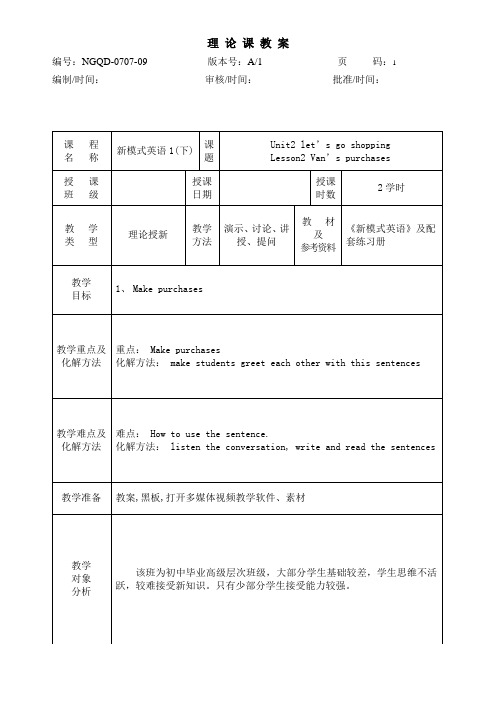
教案,黑板,打开多媒体视频教学软件、素材
教学
对象
分析
该班为初中毕业高级层次班级,大部分学生基础较差,学生思维不活跃,较难接受新知识。只有少部分学生接受能力较强。
教学活动
教学流程
内容
教学手段
教师活动
学生活动
评价方法与评价材料
时间分配
组织教学
1.检查学生课前准备情况。
2.上课起立,师生互致问候。
2.部分学生的学习积极性不高,对于此类学生,应加强对他们的管理和教育。
板书设计
Lesson2make purchases
一、Learn the new words
Purchases ;receipt ;total
Subtotal ; tax ; bar
二、Prices
Dollar ; cent ; penny
Nickel ; a quarter ;dime
三、Check
1、Who is the check to?
2、What is the check for?
学生停下一切与课堂无关的活动专心听讲
教师观察学生课堂的表现,及时提醒不注意听课的同学
8分钟
2.Show theprices
板书、讲授、演示
教师以多媒体展示人们在各种场合下见面的情景,并做出相应讲解。
学生仔细观察,同时认真听教师的讲述
教师观察学生课堂的表现,及时提醒不注意听课的同学
15分钟
3.Learn thekeywords
课 程
名 称
新模式英语1(下)
课题
Unit2 let’s go shopping
Lesson2Van’s purchases
Unit2 Our insect friends教案
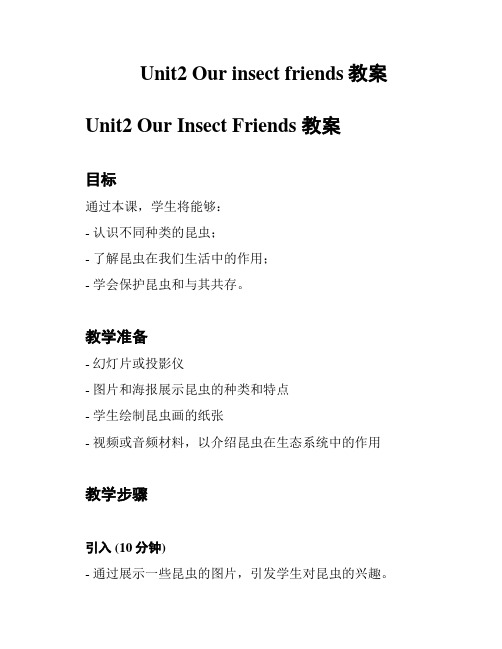
Unit2 Our insect friends教案Unit2 Our Insect Friends 教案目标通过本课,学生将能够:- 认识不同种类的昆虫;- 了解昆虫在我们生活中的作用;- 学会保护昆虫和与其共存。
教学准备- 幻灯片或投影仪- 图片和海报展示昆虫的种类和特点- 学生绘制昆虫画的纸张- 视频或音频材料,以介绍昆虫在生态系统中的作用教学步骤引入 (10分钟)- 通过展示一些昆虫的图片,引发学生对昆虫的兴趣。
- 请学生谈论自己对昆虫的了解和观察到的昆虫种类。
认识昆虫 (15分钟)- 使用幻灯片或投影仪展示不同种类的昆虫图片,并简要介绍它们的特点和性。
- 请学生观察并选择一个自己最喜欢的昆虫,并从外形、颜色、功能等方面描述该昆虫。
昆虫在我们生活中的作用 (20分钟)- 向学生解释昆虫在生态系统中的重要性,例如传粉、分解有机物和控制害虫等作用。
- 播放视频或音频材料,以展示昆虫在自然界中的作用和价值。
保护昆虫和与其共存 (20分钟)- 介绍一些保护昆虫的方法,如不使用农药、保护昆虫栖息地等。
- 鼓励学生参与保护昆虫的活动,如在校园内种植花草以吸引昆虫。
- 请学生讨论如何与昆虫和谐共处,如不捕杀昆虫、减少使用杀虫剂等。
结束 (5分钟)- 让学生进行昆虫的绘画活动,可以选择自己最喜欢的昆虫进行创作。
- 鼓励学生展示自己的绘画作品,并分享自己对昆虫的认识和体会。
教学延伸- 鼓励学生在家中观察和记录身边的昆虫,可以拍照或画画记录下来。
- 组织学生参观昆虫展览或昆虫观察活动,增加对昆虫的了解和兴趣。
评估方式- 学生的昆虫画作品和描述- 学生对昆虫在生态系统中作用的理解程度的口头表达参考资料- 昆虫图书、海报和杂志- 在线视频和音频资源。
- 1、下载文档前请自行甄别文档内容的完整性,平台不提供额外的编辑、内容补充、找答案等附加服务。
- 2、"仅部分预览"的文档,不可在线预览部分如存在完整性等问题,可反馈申请退款(可完整预览的文档不适用该条件!)。
- 3、如文档侵犯您的权益,请联系客服反馈,我们会尽快为您处理(人工客服工作时间:9:00-18:30)。
Unit 2Professional Papers1. Definition of professional papersA professional paper is a typewritten paper in which professionals present their views and research findings on a chosen topic. It is variously known as the “research paper”, “course paper”, “thesis paper” or “library paper”. Despite the various names, the task of the author of a paper is essentially the same: to read on a particular topic, gather information about it, and report the findings in it.A professional paper can not be written randomly. It must conform to a special format, which governs the entire paper from the placing of the title to the width of the margins, and to the notation used in acknowledging material drawn from other sources.A professional paper differs from other non-professional essays in that it involves the u se of library sources from which facts, quotations, and the opinions of others are drawn to explain, support, or authenticate ideas in the paper. These sources are identified by num bered notes, places at the end of the paper or at the bottom of the page. A professional paper usually conclu des with a bibliography, and an alphabetical list of all sources cited.2.Classification of professional papersThe four kinds of papers usually assigned in universities and colleges are (1) report papers; (2) research papers;(3) course papers, and (4)thesis papers.1) Report PaperThe report paper summarizes and reports the findings of an other on a particular subject. The writer neither judges nor evaluates the findings, but merely catalogs them in a sensible sequence.2) Research paperA research paper can be intelligent, well informed, interesting, and original in its conclusions. It draws its material from many sources and aims to assemble facts and ideas by studying them to draw new conclusions on the basis of obtained data observed facts, or to present the material in the light of a new interest.3) Course PaperDifferent from report papers and research papers, course papers are written after a specific course is learned or are designed at the end of a term. This type of paper is, therefore, also called “term paper”.4) Thesis PaperUnlike report papers, the thesis paper takes a definite stand on an issue. A thesis is a proposition or point of view that a writer or speaker is willing to argue against or defend. A paper that argued for ratification of a certain event would therefore be a thesis paper.3. Linguistic Features of Professional Papers1) Formal StyleA professional paper deals with the study of some objective facts or problems, and the conclusion that is drawn should be based on relevant data, not on personal likes and dislikes. It is particularly important in any kind of scientific inquiry; it does not matter who is conducting the experiment or investigation. Being impersonal and free from emotional factors is one of the important features in professional writing. The focus of professional writing is upon the data and upon the analysis of the data, for example, instead of writing:I carried out an experiment to investigate the effect of light on plant growth.It would be more conventional to say:An experiment was carded out to investigate the effect of light on plant growth.Generally speaking, formal writing sets an unusually high value on objectivity, meticulousness, accuracy, and restraint. It is directed to the reader’s mind and makes little efforts to appeal to his emotions. Its purposes are utilitarian, and it is usually intended for readers who already have, to some degree, a special interest in the subject matter or are even experienced colleagues in the same trade.2) Specialized TermsThe terms in professional papers are typically specialized. A great number of professional words and terms can only be understood by the specialists in the fields, e.g., decoder (译码器), multi-quantum transition (多量子跃迁), Read Only Memory (只读储存器) and conversational implicatures (会话含义), etc. Examples like these are too numerous to mention one by one.3) Rigid Sentence StructureAs we know, the function of professional papers is to reveal creative research achievements and exchange latest research information. The arguments in professional papers will be convincing if they are presented concisely and concretely. A rigid sentence structure is therefore reflected to meet this requirement.4) Formatted ElementsThough there are no set rules, a complete professional paper in its finished form usually has a regular format composed of the following elements: the title, author(s), affiliation(s), abstract, keywords, introduction, body of the paper (theoretical description including calculation, inference, reasoning, conclusion, etc. or experimental description including techniques, methods, materials, results and analysis, etc.), acknowledgments, appendices, references or bibliography, etc.4. Search for Professional PapersDifferent kinds of papers can be found from various sources:1) JournalsJournals are usually edited and published by learned societies or associations monthly, bi-monthly, or quarterly; for example, transactions, published by the American IEEE (Institute of Electrical and Electronic Engineers), and circulated widely in academic circles all over the world.2) ActaActa are mainly published by institutions of higher learning. Their contributors are chiefly university professors and regional research scholars, including graduate students, in academic institutions.3) Bulletins, Circulars or GazettesSuch bulletins are mainly edited and designated for the publication of briefs of research findings, preliminary results on some research programs, science news or notices of scientific seminars and conferences. Among the most famous of such publications are the Bulletin of the American Physical Society and the Bulletin of American Mathematical Society, etc.4) Rapid CommunicationsThis kind of publication belongs to the public correspondence and letter-form publications. Their contributors are mainly scientific workers, professional technical information and data workers, editors of professional journals and engineers. Rapid Communications enjoy popularity among professionals for being quick, direct and brief.5) ReviewsCommentary or summary articles are usually carried in specialized journals called Reviews, such as Comments on Modern Physics (published by the Physics Society under the Royal Academy of Sciences, U.K.) and Physical Review (published by the American Society of Physics, U.S.A.). The articles and papers published in such reviews are various in length and scope. They may include original research papers, comments and reviews on some authors and their papers or books, survey of current developments and research tendency analysis. Many famous international scholars, researchers and physicists are invited to work for and contribute to these reviews. 6) ProceedingsProceedings are collections of papers of the corresponding academic conferences at which these papers or commentaries are presented. Such proceedings are often published in the form of special issues, supplements or proceedings series. Category titles like “technical”, “scientific”, “academic”, “research”, “development”, etc. are usually put before the paper titles to help the readers in their choice.7) Dissertation Abstract InternationalDissertation Abstract International (DAI) is published monthly by University Microfilms International and includes abstracts of doctoral dissertations submitted to UMI by 550 participating institutions in North America and throughout the world.Each author-prepared abstract, up to 350 words in length, describes in detail the original research project on which the dissertation is based. Most of the approximately 35,000 dissertations published by UMI each year are abstracted in DAI and may be purchased in microform or as paper copies.8) Comprehensive Dissertation Index (CDI)Comprehensive Dissertation Indent (CDI) provides citations from 1861. It includes international coverage of engineering and technological literature. Corresponds to the printed Engineering Index. There are monthly updates. Abstracts and keywords are provided. American Doctoral Dissertation is included.9) On line Access to DissertationOn line Access to Dissertation describes searching the Comprehensive Dissertation Index database on DIALOG. General background and file content are presented. Numerous DIALOG search techniques are demonstrated and illustrated with actual examples. Notes the lack of in-depth subject indexing and stresses the need to search the title field. Other online sources of dissertations are briefly noted.Reflections and Practice (1)Translation Skills (2): DictionBy “diction” we mean the proper choice of words and phrases in translation on the basis of accurate comprehension of the original.In the practice of translation, what perplexes a translator most is how to find the equivalents in the language to be translated into. Great care is called for in the translation of “familiar” English words into Chinese, as their meanings vary with the change in collocation or context.In comparison with Chinese, English words are more flexible both in form and in meaning: English words of different parts of speech often assume different forms and the meaning of each word mainly depends on the context. Therefore it is often a hard task for a translator to find the Chinese equivalent of a given English word. Take the word “story” for example:(1) This war is becoming the most important story of this generation.(2) It is quite another story now.(3) Some reporters who were not included in the session broke the story.(4) He'll be very happy if that story holds up.(5) The Rita Haywoth story is one of the saddest.(6) A young man came to Scotti's office with a story.Each of the six “story” here manifests its own connotation. In sentence (1) it refers to “event”; (2) “situation”;(3) “inside information”; (4) “statement”; (5) “experience”; (6) “law case.” And therefore, the corresponding Chinese versions are:(1)这场战争将成为这一代人经历的最重大的事件。
